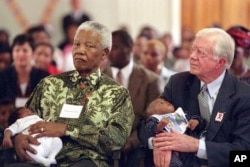Jimmy Carter was the first US President to pay a state visit to Sub-Saharan Africa. He once called helping Zimbabwe transition from white rule to independence as “our greatest success”. And when he died at the age of 100, his foundation’s work in rural Africa had nearly completed his quest to eliminate a disease that affected millions for the first time since the eradication of smallpox.
The African continent, an emerging region with a population rivaling China’s that is set to double by 2050, is where Carter’s legacy is most evident. Until his presidency, American leaders had shown little interest in Africa, even though there were independence movements in the region in the 1960s and 70s.
“I think the day of the so-called ugly American is over,” Carter said during his 1978 warm reception in Nigeria, Africa’s most populous country. He said the official state visit removed “nostalgia for the past by the United States”, and he joked that he and Nigerian President Olusegun Obasanjo would farm peanuts together.
Cold War tensions drew Carter’s attention to the continent as the US and the Soviet Union competed for influence. But Carter also drew on the missionary traditions of his Baptist faith and the racial injustice he witnessed in his homeland in the US South.
“For too long our country ignored Africa,” Carter told the Democratic National Committee in his first year as president.
African leaders soon received an invitation from the White House, caught by surprise by the sudden interest of the world’s most powerful country and what it could mean for them.
“There is a fresh air there which is invigorating,” said visiting President Kenneth Kaunda of Zambia.
Carter said after his first trip to Africa, “I find a common theme in the advice to leaders of African countries: ‘We want to manage our own affairs. We want to be friends with the two great superpowers.’ “We don’t want to pick the upper hand.”
This theme still resonates today as China also competes with Russia and the US for influence and access to Africa’s raw materials. But no superpower has had an ambassador like Carter, who made human rights the centerpiece of American foreign policy and made 43 more trips to the continent after his presidency, promoting Carter Center projects that gave Africans the power to determine their own future. Demanded to be empowered.
As president, Carter focused on civil and political rights. He later broadened his efforts to include social and economic rights as keys to public health.
Sudanese legal scholar Abdullahi Ahmed An-Naim said, “They are human rights based on humanity. And Carter is the single person in the world who has done the most to advance this idea.”
Even as a candidate, Carter thought about what he could accomplish, stating Slacker magazine, “Maybe I should now abandon my campaign for the presidency and begin a crusade for black-majority rule in South Africa or Rhodesia [now Zimbabwe]Maybe later we realize that there were opportunities to do wonderful things in our lives and we didn’t take advantage of them.”
Carter welcomed Zimbabwe’s independence just four years later, hosted new Prime Minister Robert Mugabe at the White House and quoted the Rev. Martin Luther King, Jr.: “Injustice anywhere is a threat to justice everywhere.”
“Carter told me that he spent more time on Rhodesia than on the entire Middle East. And when you go into the archives and look at the administration, there is actually more information on southern Africa than on the Middle East,” the historian And author Nancy Mitchell said.
Relations with Mugabe’s government soon soured amid deadly repression, and by 1986 Carter led a walkout of diplomats in the capital. In 2008, Carter was banned from Zimbabwe, a first in his travels. He called the country “a basket case, an embarrassment to the region”.
Eldred Masunangure, a Harare politician, said, “Whatever the Zimbabwean leadership thinks of him now, Zimbabweans, at least those who were there in the 1970s and 80s, will always regard him as an icon and a steadfast promoter of democracy. ” Analyst.
Carter also criticized the South African government for its treatment of black citizens under apartheid, at a time when South Africa was “trying to integrate itself with the dominant economies around the world,” current President Cyril Ramaphosa said of Carter. Said on X after death.
The think tank Jimmy and Rosalynn Carter, founded in 1982, played a key role in monitoring African elections and brokering ceasefires between warring powers, but fighting the disease was the third pillar of the Carter Center’s work.
“When I first came here to Cape Town, I almost had a fight with the President of South Africa, Thabo Mbeki, because he was refusing to get AIDS treatment,” Carter told a local newspaper. “That’s the closest I’ve come to a fight with a head of state.”
Carter often said that he was determined to survive even the last Guinea worm to infect mankind. This parasitic disease that once affected millions of people has been nearly eliminated, with only 14 cases recorded in a handful of African countries in 2023.
Carter’s pursuits included arranging a four-month “Guinea worm ceasefire” in Sudan in 1995 so that the Carter Center could reach approximately 2,000 endemic villages.
“They taught us a lot about having faith,” said Makoy Samuel Yibi, who leads a Guinea worm eradication program for South Sudan’s health ministry and grew up with such people. “Even the poor call these people poor, you see. It’s a touching virtuality to get the attention of the leader of the free world and to try to uplift them.”
Such dedication has impressed health officials in Africa for years.
“President Carter worked for all mankind, regardless of race, religion or status,” Liya Tadesse, Ethiopia’s former health minister, said in a statement shared with the AP. Ethiopia, the continent’s second most populous country with more than 110 million people, had zero Guinea worm cases in 2023.







Leave a Reply